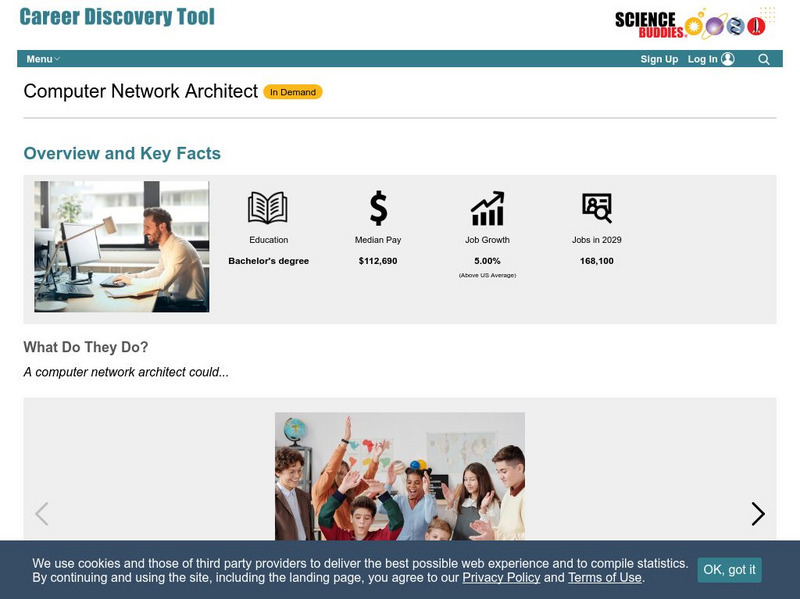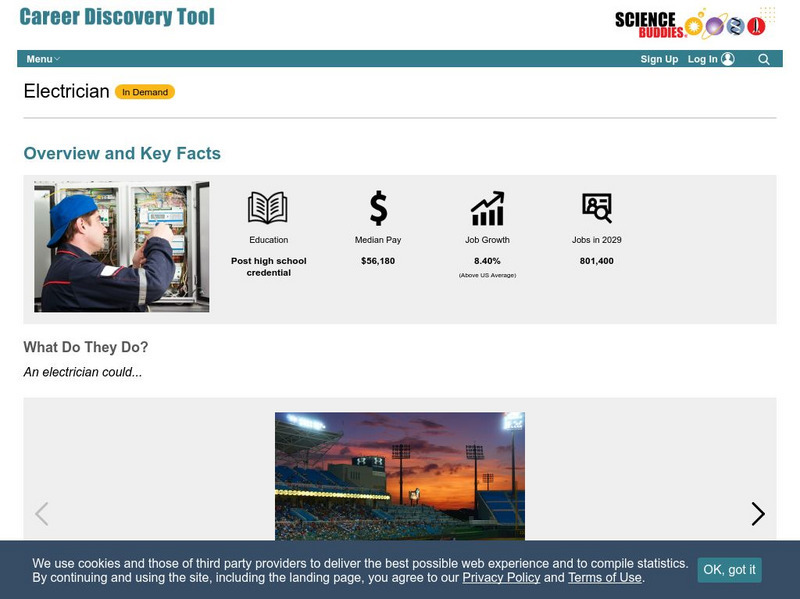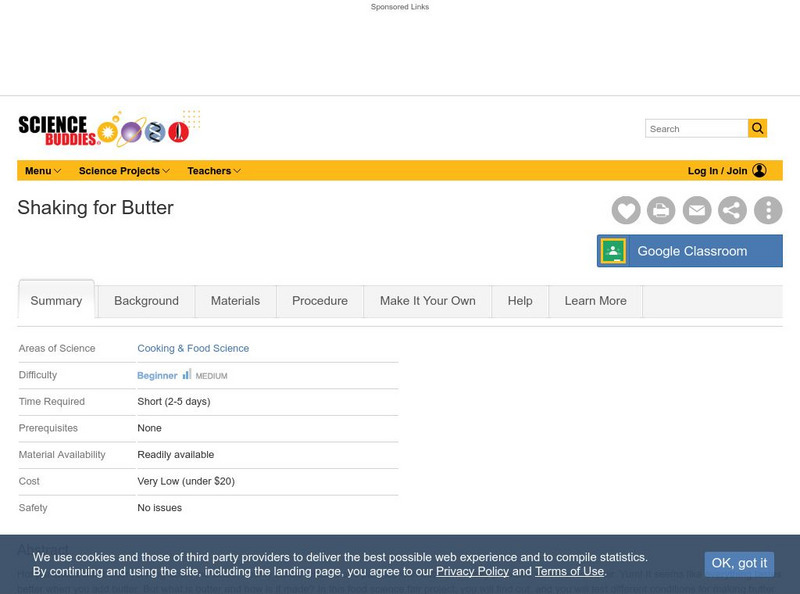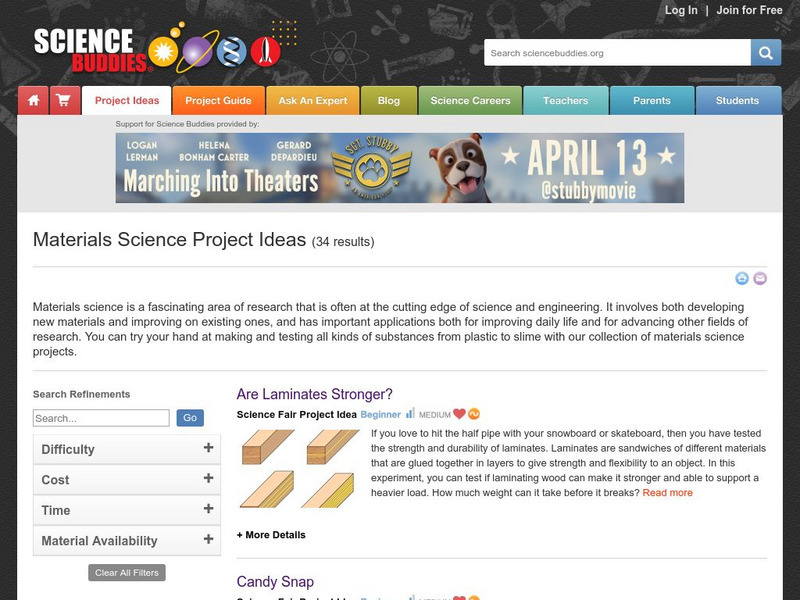Science Buddies
Science Buddies: Career Profile: Computer Network Architect
A big name for a big job, the network systems and data communications analyst works with computer networks within companies. Science Buddies offers a career profile outlining the many duties of the systems analyst as well as the...
Science Buddies
Science Buddies: Career Profile: Electrician
Electricians are involved in construction and maintenance. This Science Buddies site lays out the requirements needed to become an electrician, as well as the education and job description. Included are interviews with people who have...
Science Buddies
Science Buddies: Humic Acid and the Optimum Soil for Plants
Humic acid is touted as an organic soil additive to improve plant growth by multiple means. Does it really work? Here's how you can find out.
Science Buddies
Science Buddies: Dots Per Inch (Dpi) and Image Quality
Your digital photo comprises a certain number of dots in the x and y directions. What happens to the print image quality as you "stretch" those dots out to larger and larger pictures? (Note: This experiment studies the dots per inch in...
Science Buddies
Science Buddies: Shaking for Butter
In this food science fair project, the student will determine the best conditions for making butter.
Science Buddies
Science Buddies: Materials Science Project Ideas
A list of projects ideas through which students test materials for various qualities, such as strength, flammability, density, and resistance to corrosion.
Science Buddies
Science Buddies: Steps of the Scientific Method
An explanation of the scientific method for learners preparing a science fair project, or any science project. Each step of the process is supported with additional helpful information and advice.
Science Buddies
Science Buddies: Scientific Method Variables/hypothesis
Find out what variables are in a scientific investigation and what the difference is between an independent, dependent, and controlled variable. Look at samples of different types of variables and find out what makes a good variable.
Science Buddies
Science Buddies: Scientific Method Conclusion
The conclusion of a science experiment summarizes how your results supported or contradicted your hypothesis. See a sample of a conclusion and find out what makes a good conclusion.
Science Buddies
Science Buddies: M&m Survival Challenge
In the wild, there are two types of animals: the hunters and the hunted. A good predator is always on the prowl for fresh prey. What can an animal do to stay off of the menu? Find out how some animals use camouflage, and why sometimes it...
Science Buddies
Science Buddies: Project Ideas: Crime Scene Chemistry: The Light of Luminol
Experiment with the chemical called luminol, which emits a blue light when it reacts with other chemicals. This science fair project explores whether temperature affects the amount of light emitted. The Science Buddies project ideas are...
Science Buddies
Science Buddies: Scientific Method Data Analysis/graphs
At the end of your experiment you should review all of the data you have collected. See samples of data analysis charts and graphs. Find out what makes for a good chart or graph using the self-grading rubrics.
Science Buddies
Science Buddies: Defining an Engineering Design Problem With Paper Airplanes
In this fun lesson plan, you will be the "customer" ordering a paper airplane, and your student teams will be engineering companies that will manufacture planes. Before they start making planes, they need to define the criteria and...
Science Buddies
Science Buddies: Design Requirement Examples
The design requirements for a science project will differ from those of anyone else because it will apply to a specific problem statement and the product, system, or experience that is being designed. In the table, are some examples of...
Science Buddies
Science Buddies: Kinesthetic Astronomy: Earth's Rotation
This kinesthetic activity will demonstrate concepts like rotation and orbit, clarify movement and direction, and help students understand why earthlings see different things in the sky.
Science Buddies
Science Buddies: Build a Wall Marble Run
In this activity, you will use recyclable materials to make your own wall marble run.
Science Buddies
Science Buddies: How to Harvest Water From Fog
In this activity, you will learn about a creative way to collect water from the air.
Science Buddies
Science Buddies: Cumulus Maximus: Make Your Own Cloud!
In this experiment, you'll make your own cloud in a jar, and get to test the conditions that are required to make a cloud form.
Science Buddies
Science Buddies: Build a Balloon Car
With craft and recycled materials, kids can make all kinds of rolling vehicles. Add balloons to make this balloon car and see Newton's laws of motion in action.
Science Buddies
Science Buddies: Sound and Vibrations 2: Make Sprinkles Dance
First graders explore the connection between sound and vibrations.
Science Buddies
Science Buddies: Turn Milk Into Plastic!
In this hands-on lesson plan, learners will conduct a simple milk-transforming experiment to explore how plastics can be derived from a natural resource such as milk.
Science Buddies
Science Buddies: Make a Miniature Habitat
Hands-on lesson plan in which students use mostly natural materials to build a shoebox habitat that mimics a real-life habitat for an animal of their choice.
Science Buddies
Science Buddies: Kinesthetic Astronomy: Longer Days, Shorter Nights
This kinesthetic activity demonstrates to students that the Earth's tilt is what is responsible for shifting light patterns and the change in seasons.
Science Buddies
Science Buddies: Popsicle Stick Chain Reaction
Activity uses tongue depressors to set off a chain reaction of sticks flying in the air.














